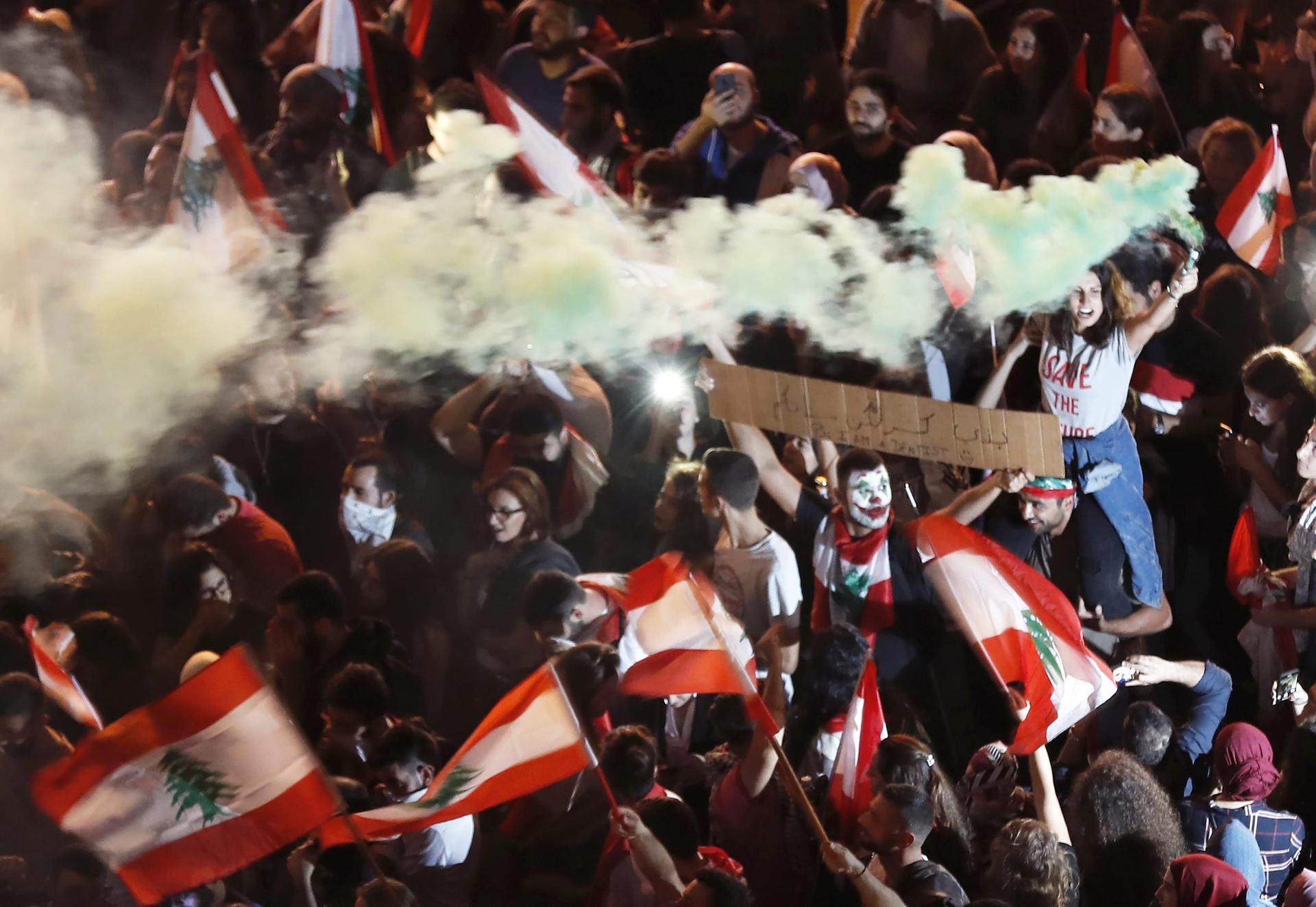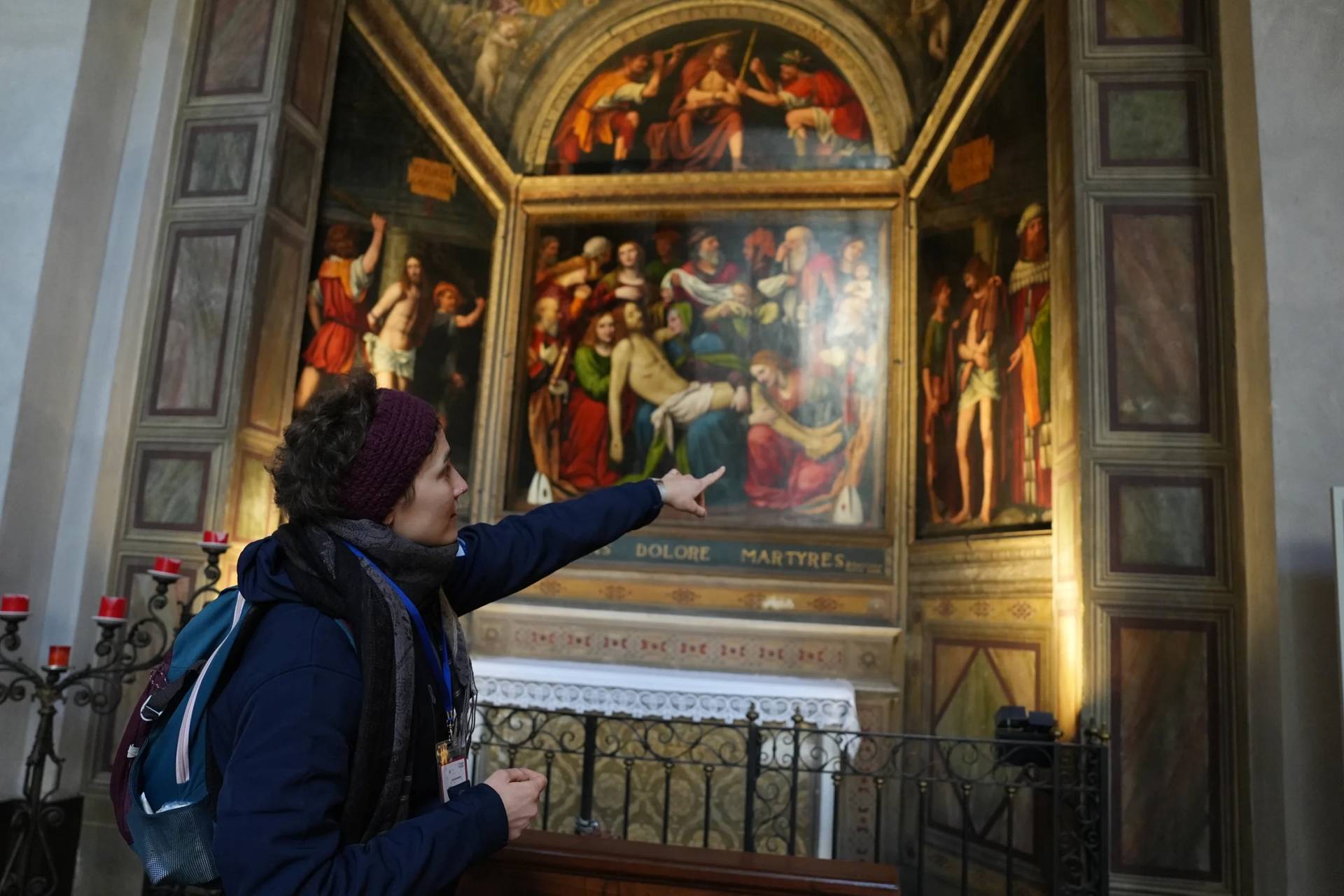BEIRUT — Anti-government rallies received major support Wednesday from the country’s Christian and Muslim leaders who described the weeklong protests as “a historic and exceptional popular uprising” against corruption and mismanagement and appealed to the government to meet the demands of the people.
Hundreds of thousands of people have flooded public squares across the country in the largest protests in over 15 years — a rare show of unity among Lebanon’s often-divided public in their revolt against status-quo leaders who have ruled for three decades and brought the economy to the brink of disaster.
The nationwide demonstrations that began last week grew larger on Monday, after Prime Minister Saad Hariri announced a package of economic reforms the government hopes will help revive the struggling economy. The protesters have denounced Hariri’s package as empty promises and are demanding the resignation of his Cabinet.
Protesters have shattered taboos, openly taking aim at powerful sectarian leaders from their own communities for the first time.
On Wednesday, clashes broke out in the southern market town of Nabatiyeh, which said that municipal employees and government supporters armed with clubs and sticks attacked a rally, injuring nine people. The town is a stronghold of the powerful Shiite groups Hezbollah and the Amal group of Parliament Speaker Nabih Berri, who has been harshly criticized by the protesters.
“These are Hezbollah’s thugs,” screamed a woman defiantly. She was among the anti-government protesters as bearded men dismantled what used to be a stand where people had gathered every day since the demonstrations began last week. It was not clear who attacked the protesters.
The municipality said in a statement it had moved to open the main road and market after shop owners complained about the closure.
Hezbollah is a strong backer of President Michel Aoun and the group’s leader, Sayyed Hassan Nasrallah, has expressed support for the demands of the protesters, but made it clear he will now allow the targeting of the president.
The Lebanese Red Cross said nine people were injured in Nabatiyeh, five of whom were taken to hospitals and four treated on the spot.
In other parts of the country earlier Wednesday, Lebanese troops moved in to open major roads in Beirut and other cities, scuffling in some places with anti-government protesters who had blocked the streets for the past week, grinding the country to a halt.
The army vowed to protect the protesters, but said roads have to be opened so that people can get on with business.
Schools, universities, banks and government institutions have been closed for the past week, as protesters blocked main roads and intersections. The closures have cut off the capital from the Bekaa region, leading to some shortages in foodstuffs and fruits and vegetables.
On Wednesday morning, troops moved in large numbers to open several major roads in the capital and other cities, facing off with protesters carrying red, white and green Lebanese flags. In some places, protesters refused to move away, leading to the scuffles. Thousands of soldiers deployed in Beirut and its suburbs, and in the southern cities of Sidon and Tyre to clear the roads. They were able to clear some and failed in other places.
The two sides were keen to avoid friction and not to clash. Some protesters were seen giving soldiers red roses, telling them their suffering is identical as they are both victims of corruption. Some soldiers were overcome by emotions and at least one broke down in tears.
The Lebanese army is one of the few state institutions that enjoys wide support and respect among the public as it is seen as a unifying force in the deeply divided country.
Beirut’s northern suburb of Jal el-Dib area witnessed scuffles between protesters and troops who managed to briefly open the main highway to the capital before it was blocked again when large numbers of people, including legislator Sami Gemayel, marched from nearby areas and closed it again.
The Lebanese army issued a statement later saying it is committed to protecting the protesters as long as they are not closing roads. “We are opening the roads for your sake so that people get their needed medicine, food and gasoline,” the army said.
On Wednesday, Cardinal Bechara Rai, the head of the Maronite Catholic church, Lebanon’s largest, called on the government to listen to the people’s demands, adding that “the people would not have risen had they not reached extreme pain.”
Rai called on Aoun to start consultations with the country’s political and religious leaders to take action in response to people’s demands.
Beirut Metropolitan Orthodox Archbishop Elias Audi said a political “vacuum is better than the vacuum we are living today.” He added the country was paralyzed before the protests began, an apparent reference to widespread corruption.
The Mufti of the Republic Sheikh Abdel Latif Darian, the country’s top Sunni Muslim cleric, also expressed support to the protesters, as did the religious leader of the Druze community.
Lebanon has the largest percentage of Christians in the Middle East, a third of its 4 million people, with Maronite Catholics being the largest sect. Lebanon is also the only Arab country with a Christian head of state. The country is almost third Christian, third Sunnis and third Shiites.
Amid the calls for fighting corruption, a prosecuting judge issued an order against former prime minister Najib Mikati, as well as his son and brother and also Audi Bank, Lebanon’s largest, for illegally obtaining housing loans subsidized by the central bank.
Mikati and his other brother, Taha, are among the richest businessmen in Lebanon and made their fortune in telecommunications. According to Forbes, they are worth $2.5 billion each.
Mikati later told reporters he was taken by surprise, adding that he sees the move as a “political message.” Audi Bank also denied being involved in illicit gains.
Crux is dedicated to smart, wired and independent reporting on the Vatican and worldwide Catholic Church. That kind of reporting doesn’t come cheap, and we need your support. You can help Crux by giving a small amount monthly, or with a onetime gift. Please remember, Crux is a for-profit organization, so contributions are not tax-deductible.












